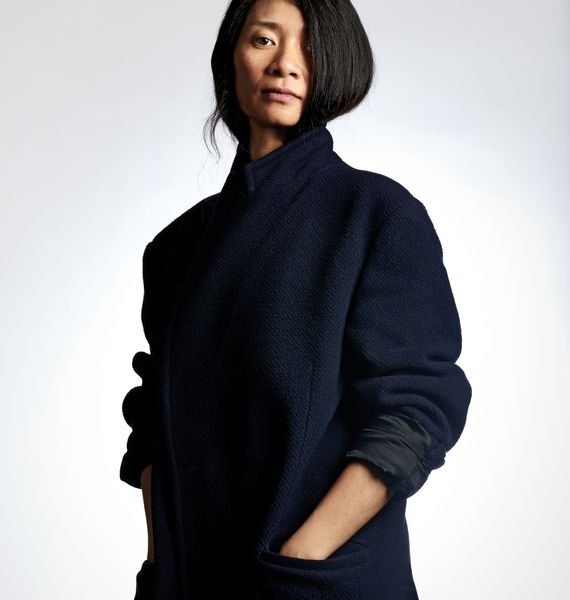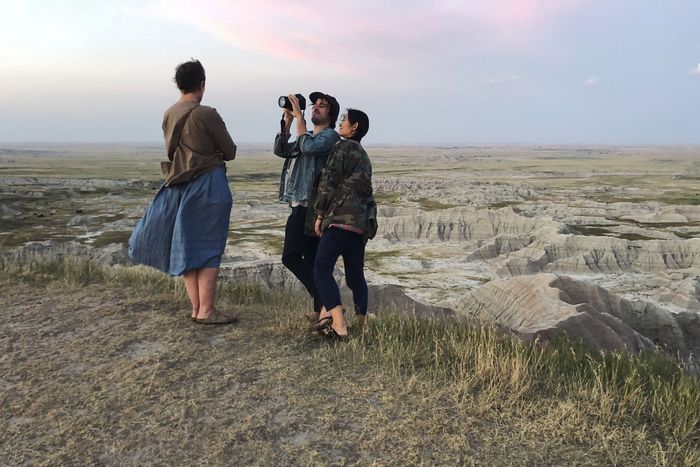Who is Chloé Zhao, the most sought after director in Hollywood

“Loud, obnoxious, big bones — I love stereotyping my own people.”, says Zhao, who was trying to articulate her own slippery sense of self, owing to have left her country behind and traveled the World.
When she was growing up in Beijing in the 1980s and ’90s, being Chinese was the way of life, that was what constituted their identities. After crossing the borders of her nation, She found her way to the Pine Ridge Indian Reservation in South Dakota — where she would eventually make her generation’s best film about the American West.
Zhao certainly wasn’t the first one to come from the Orient and tell her story, but she was the one who tried to make herself porous, attempted to get past the usual narratives that one would expect from immigrants. She recalls being the only Chinese person around, and it made her origins feel incidental to her. What was the utility of thinking of yourself as part of a group when there was no group — when it was just you? Can feeling as if you’re from nowhere be an advantage? Can it be an advantage to be the only person representing where you’re from and what you believe in?
Zhao was the only Chinese person around wherever she went, there were no familiar faces for her. Well, she knew how to use it in her favor and by the time she started shooting Nomadland, an Oscar-favoured movie, she had attracted the attention of a major star, Frances McDormand, who co-produced the film and plays its heroine. Nomadland is by no means a standard Oscar movie, but this hasn’t been a remotely standard Oscar cycle.
The film has managed to become a likely Best Picture nominee and the current favorite to win. And it may well be the defining movie of the past tumultuous, terrible year. It follows a loose collection of nomads for whom “retirement” means traveling the country for seasonal work after losing their savings in the 2008 recession or never having any, to begin with. It’s an exploration of tattered safety nets, stubborn individualism, and economic decay in the heartland, as seen through the eyes of Fern (McDormand), who starts living out of her van after the death of both her husband and the community in which they made their home.
She is now working on a Marvel Movie, Eternals, which features MCU’s first gay superhero and its first deaf one. One could easily say no other director would’ve been better for a movie that, in many ways, will speak volumes about the issues of inclusivity, diversity, and LGBTQ rights that find the society divided today. It features a diverse cast that includes Kumail Nanjiani, Brian Tyree Henry, Salma Hayek, and Gemma Chan as well as Angelina Jolie and Richard Madden. Zhao spends her time juggling between the post-production of her big movie and fulfilling the demands of the awards campaigns for Nomadland. Her career arc, from a microbudget drama set on a reservation to a saga about immortal aliens, may sound disorienting, but this is what success looks like for a modern director in Hollywood.
Filmmaking was a career Zhao sidled up to. She wanted to tell stories for a living but wasn’t great at painting, photography, music, or any of her other interests. “You don’t have to be a master of anything, just a jack-of-all-trades, to be a director,” she says. “I hire people who are really good at their craft, then put them together.” She enrolled in film school at NYU. Her classmates were what she describes as a lot of people experiencing quarter-life crises. A sample conversation she offers: “ ‘Why did you go to film school?’ ‘I went to a liberal-arts college, and I don’t know what to do with my life.’ We had a lot in common.” She had Spike Lee as a professor, whom she could always count on to be hilariously and brutally honest. NYU is also where she met Richards, a student from Cornwall, England. The two started up a romantic and creative partnership, and he would go on to shoot her first three films. “She was gnarly and extreme — my idea of the collaborator I hoped to find a film school,” Richards says. “Most people I was spending time with were sitting around talking about their projects. Chloé was doing them. And so I jumped on that train.”
Zhao loved the city, but the difficulty of securing locations to shoot in was stifling. “I can’t make it there,” she found herself realizing. “I don’t think I can make good enough films in New York.” For her second-year film, she flew back to China to do what she describes with an eye roll as “a lot of imitating Zhang Yimou’s Raise the Red Lantern.” She has no intention of letting the resulting short see the light of day, yet it crystallized something about what would become her sensibility: “It’s the first time I worked with nonprofessional actors. I went out there and found a young girl who was in a dance school.” The point of the assignment had been to work with actors, but Zhao discovered she preferred to build a film around someone who was already in a place she wanted, focusing instead on the world she was putting onscreen. “I realized,” she says, “I’m not the kind of writer-director that can create this character on my own in a dark room.”

She did not possess the gravity and the knowledge about Native Americans but she was struck by the images and filled with curiosity and a feeling that, as she puts it, “maybe I could tell a story to make things better.” She’s not the first artist to have been driven by some combination of good intentions and ego, nor the first filmmaker born into privilege to have been drawn to characters living in poverty. It’s a feeling she now describes as a trap.
The Oglala Lakota reservation of Pine Ridge is one of the largest in the U.S. and contains some of the country’s poorest counties. Journalists and artists had been making the trip there for long enough that the residents were adept, Zhao quickly discovered, at telling her what they thought she wanted to hear — stories of poverty, alcoholism, historical trauma. “It took me a good six months to a year to get past that. If I had just dipped in and out, I would never have,” she says. She still had a place in New York but was spending long stretches in South Dakota getting to know people. “Let’s talk about what you have for dinner,” she would say. “What did you really have for dinner? What do you want me to say you have for dinner?”
“Honestly, when I met Chloé, I thought she had some Native in her,” says Fuller, one of the cast members who came from an acting background. “She was very in tune. It was like one of our own.” They also required Zhao to determine where vulnerability gives way to possible exploitation. What she requires of her performers is something she has grown more confident about over the course of her three films. “I have asked a lot,” she admits.
Nonprofessionals, untrained actors, real people — there’s no ideal term for the tradition Zhao is part of, which stretches from Sergei Eisenstein, Robert Bresson, and Italian neorealism to The Florida Project’s Sean Baker, who started using the term first-timer after finding that nonprofessional tended to make people in the industry write performers off. And isn’t someone who gets paid to act in a movie a “professional” by definition? Haven’t scores of stars risen to fame without formal training? The idea in casting people who aren’t actors by profession or aspiration is to get away from the artifice that’s inherent in traditional filmmaking — but that tends to sell short how much art and effort is involved.
Directors may be slotted into these projects, but the question of how much of a stamp they can put on the material remains open. While the Marvel Cinematic Universe may be a giant multi-platform enterprise that’s currently ruling popular culture, it also needs voices like Zhao’s. As it continues expanding into streaming, the movies have started to introduce characters that are less familiar to audiences with only a passing knowledge of comics. Eternals, based on Jack Kirby’s creations from the ’70s, constitute a much deeper cut than, say, Spider-Man. The new era of the MCU on the big screen would seem to demand directors with a vision for characters who can’t depend on name recognition. Zhao may now be working with a cast made up largely of professionals, but she has found that interesting things happen when you pry actors out of their protective coating of celebrity glamour. Her approach to directing them hasn’t changed that much. Kumail Nanjiani recalls meeting with Zhao about his character, an Eternal living as a Bollywood star. “I was like, ‘Okay, so how do you see Kingo?’ She was like, ‘He’s you. I picked you because I wanted him to be you.’ That’s how she picked the entire cast. She wanted everybody to put pieces of themselves into their characters.”
Cinema is a reflection of society and society, in turn, adapts from Cinema. We have all known for years now as it continues to impact our lives in ways we cannot imagine. However, it is crucial that we as a society reduce the polarization and become more tolerant, kind individuals. Movies can do that for us. Zhao’s career is an example to all those immigrant voices stifled by stigma and discrimination and lack of confidence. She is fierce but sensitive and has the capacity to capture perspectives. She has been thinking a little differently about her place outside American consciousness and the pains of its history. “I should take those things into consideration because they are deeply rooted in the psyches of people who grew up here, not in mine,” she says. “In the end, we leave, but their lives continue.”



